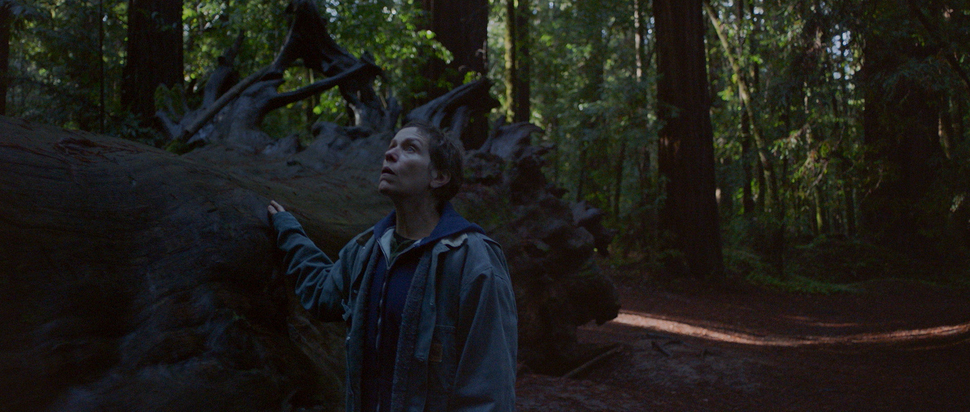Nomadland and the American Myth
At last, Oscars frontrunner Nomadland becomes available to UK film fans. We consider the ways in which the film explores the American mythos of work as liberation while offering an alternative way of life outside the shadow of capitalism
When Minari, a Korean-American story set on an Arkansas farm, was relegated to Best Foreign Language Film at the Golden Globes, it ignited a fierce conversation about how Americanness in cinema is categorised. Perhaps appropriately in this post-Trump world, the question lies at the heart of almost every film in this year’s awards slate. From Aaron Sorkin’s The Trial of the Chicago 7, a fantasy of white liberal resistance, to Shaka King’s Judas and the Black Messiah, an unflinching examination of anti-Black state violence told through the assassination of Black Panther leader Fred Hampton, the nebulous idea of the American story – how it is defined and who can tell it – has taken centre stage.
It is fitting, then, that Chloé Zhao, director of Nomadland and the first woman of colour to be nominated for a best director Oscar, is emerging as this awards season’s frontrunner. With three feature films under her belt, Zhao has always told distinctly American stories, albeit ones frequently excluded from dominant conceptualisations of American identity. Her first two films, Songs My Brothers Taught Me and The Rider, are set in the Pine Ridge Indian Reservation in South Dakota and revolve around the Lakota Sioux and their intimate, everyday lives. With Nomadland, her adaptation of Jessica Bruder’s non-fiction book Nomadland: Surviving America in the Twenty-First Century, Zhao has again turned to America’s margins, depicting the lives of modern-day nomads travelling around the country in search of work.
Specifically, it is the exploration of the nomads’ working lives that is central to Nomadland’s interrogation of American self-identity and the fragile construction of the American Dream. The narrative follows Fern, a fictionalised character played by Frances McDormand, who leaves home after the economic depression of the noughties to search for temporary work at Amazon warehouses, campsites, and rural farms.
Zhao’s depiction of the gig economy has been critiqued as somewhat toothless, her portrayal of Amazon in particular framed as a depoliticised engagement with one of late-stage capitalism’s most destructive empires. And admittedly, compared to Bruder’s book – whose nomads rage at Amazon’s inhumane labour conditions – it is a markedly understated approach. Yet rather than an implicit endorsement of these systems, Zhao crafts an impressionistic examination of Fern’s own entrenchment in the capitalist ideologies that define the American experience.
“I need work,” Fern insists at a government employment centre. “I like work.” Shunning offers of help from friends and family, Fern determinedly pursues the American mythos of work as liberation, self-reliance as self-identity. “I think what the nomads are doing is not that different than what the pioneers did,” argues her sister, further cementing Fern’s way of life as integral to the American foundation of individualist progress.
Yet against her own protagonist’s expectations, Zhao offers alternatives to a life dictated by these traditions. Striking moments of childlike wonder and play resist the working grind: in one scene, the normally serious Fern giggles like a schoolgirl as she and a fellow nomad discover and throw around abandoned underwear on a campsite; in another, the nomads explore a luxury RV while Fern sits in the driving seat making engine noises. These scenes act not merely as flashes of respite in the midst of work, but as giddy moments of anti-work, refusals to participate in the value-driven ideologies that the mundane tasks of the campsite or the wealth of the RV symbolise.
It is a determined note of resistance that encapsulates Nomadland’s approach to community – community that counteracts the alienation that capitalism tries to enshrine. Fern joins a nomad retreat in the desert, where the camp leader compares them to workhorses who “have to gather together and take care of each other.” When Fern’s tyre gets a puncture out in the wilderness, her only source of help is another nomad, who asks for assistance with their own van in return. Together, the nomads share stories of grief and loss, forming a support network that extends beyond mere material survival. In doing so, the film moves away from Fern’s individualist journey into a profoundly tender study of the networks of relationships that can exist beyond the processes of work and selfhood, and the incalculable comfort and value that they can offer.
There is a marked absence of teleology in Nomadland: the end of the film circles back to the seasonal work at Amazon, and to the start of another New Year. Yet some things have subtly, quietly changed. Fern might continue to be exploited by the gig economy and the impossible realisation of the American Dream, but the small acts of her everyday life have reoriented towards a more emancipatory politics: rather than sitting alone in her van, she walks the campsite holding a sparkler, wishing others a happy new year. Ultimately, it is not through the American pioneering spirit or through work that Fern will find happiness, but through an acknowledgement of her own unprofitable interdependence. Another world is indeed out there. It is just different from the one she seeks.
Nomadland streams on Disney+ in the UK from 30 Apr and is in UK cinemas from 17 May
Chloé Zhao’s debut film, Songs My Brothers Taught Me, streams on MUBI from 9 Apr
